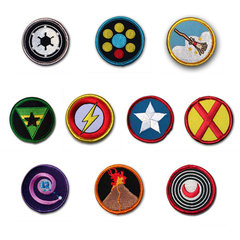 Fanboy Scouts has launched a series of Merit Badges for Geeks including achievements for Speedster, Mt. Doom, Tie Fighter Pilot, Away Team, and more.
Fanboy Scouts has launched a series of Merit Badges for Geeks including achievements for Speedster, Mt. Doom, Tie Fighter Pilot, Away Team, and more.- Privacy in terms of contextual identity. How you present yourself to your friends is not how you present yourself to your colleagues, and what you’re willing to share in each context is going to be different.
- XKCD is probably right about the future of “old-timey” speech. “Forsooth, do you grok my jive, me hearties?” We have a hard enough time getting the mid-twentieth century right, and that’s with people around who lived it!
- Darryl Cunningham debunks the Moon Hoax in comic-strip form.
- The new Kindle looks nice. They’re starting to get to the price/feature/polish point where I’d be tempted. (Well, except for that pesky DRM…) Also, Amazon launched Kindle for Android recently, but I haven’t tried it out. While it will run on Android 1.6, it’s a bit big for my G1 unless I clear out some other apps.

Tag: privacy
Smoking Dutch Cleanser
Here’s something I just don’t understand about the whole electronic eavesdropping controversy.
Given that FISA warrants are:
- Easy to obtain
- Secret
- Obtainable retroactively, so you can legally start listening in immediately
Why is it necessary to eavesdrop without one? What’s so hard about getting a warrant?
While we’re at it, given that the bad guys almost certainly knew we were spying on them as much as we could already, what’s so dangerous about revealing the warrantless spying program?
Instead of these endless self-justifications, it would be nice to see President Bush or Attorney General Gonzales say, “You’re right, we should have gotten warrants. From now on, we will.” End of story. Instead of digging in their heels and insisting on powers that should scare the hell out of anyone, no matter what their party affiliation.
We know where your network is
Apparently wardrivers (people who cruise neighborhoods with a laptop looking for open wireless networks) have been submitting their findings to WiGLE—a searchable database and interactive map of wireless access points.
Already checked—our home network isn’t in there. (As much as I’ve locked it down, it had better not be!) But they do list several in our neighborhood.
As always, the power of the Internet can be used for either good or evil.